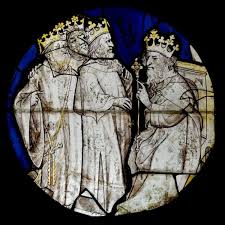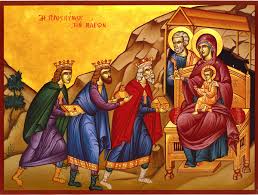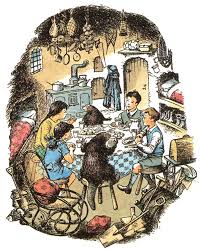In the Liturgical Year we have Epiphany. It occurs right after Christmas and before Lent. The term comes form the Greek word epiphaneia which in pagan religion was used to describe the “a manifestation or striking appearance of a deity and was used of a festival held in commemoration of the appearance of a god at some particular place.”
In the writing of Scripture the term is used to describe the historic event of Jesus Christ coming into the world and being seen as a witness to the Gentiles.
The Apostle Paul writes these inspired words using the term: “And without controversy great is the mystery of godliness: God was manifest (ἐφανερώθη transliterated ephiphany) in the flesh, justified in the Spirit, seen of angels, preached unto the Gentiles, believed on in the world, received up into glory” (1 Timothy 3:16).
In the Liturgical Calendar Epiphany is a religious feast which celebrates the manifestation of Christ to the Gentiles as represented by the Magi (Matthew 2:1–12) and occurs on January 6.
Here is Matthews record of the three kings from the East who followed the star to Bethlehem:
“Now after Jesus was born in Bethlehem of Judea in the days of Herod the king, behold, wise men[a] from the east came to Jerusalem, 2 saying, “Where is he who has been born king of the Jews? For we saw his star when it rose[b] and have come to worship him.” 3 When Herod the king heard this, he was troubled, and all Jerusalem with him; 4 and assembling all the chief priests and scribes of the people, he inquired of them where the Christ was to be born. 5 They told him, “In Bethlehem of Judea, for so it is written by the prophet:
6 “‘And you, O Bethlehem, in the land of Judah, are by no means least among the rulers of Judah; for from you shall come a ruler who will shepherd my people Israel.’”
7 Then Herod summoned the wise men secretly and ascertained from them what time the star had appeared. 8 And he sent them to Bethlehem, saying, “Go and search diligently for the child, and when you have found him, bring me word, that I too may come and worship him.”
9 After listening to the king, they went on their way. And behold, the star that they had seen when it rose went before them until it came to rest over the place where the child was. 10 When they saw the star, they rejoiced exceedingly with great joy. 11 And going into the house they saw the child with Mary his mother, and they fell down and worshiped him. Then, opening their treasures, they offered him gifts, gold and frankincense and myrrh. 12 And being warned in a dream not to return to Herod, they departed to their own country by another way” (Matthew 2:1–12).
The spiritual sense of excitement of Jesus Christ entering our world is captured in a scene described in C. S. Lewis’ book The Lion, the Witch and the Wardrobe. Over a meal in the home of Mr. and Mrs. Beaver the Pevensie children hear for the first time about a mysterious being called Aslan. Let’s listen to the thoughts and feeling of the children at this first hearing:
“They say Aslan is on the move perhaps has already landed.”
And now a very curious thing happened. None of the children knew who Aslan was any more than you do; but the moment the Beaver had spoken these words everyone felt quite different. Perhaps it has sometimes happened to you in a dream that someone says something which you don’t understand but in the dream it feels as if it had some enormous meaning—either a terrifying one which turns the whole dream into a nightmare or else a lovely meaning too lovely to put into words, which makes the dream so beautiful that you remember it all your life and are always wishing you could get into that dream again. It was like now. At the name of Aslan each one of the children felt something jump in its inside. Edmund felt a sensation of mysterious horror. Peter felt suddenly brave and adventurous. Susan felt as if some delicious smell or some delightful strain of music had just floated by her. And Lucy got the feeling you have when you wake up in the morning and realize that it is the beginning of the holidays or beginning of summer.”
Lewis has captured that remarkable supernatural sense of God’s presence by resetting it in a fairytale. But this is only a faint echo of the cosmic reality of what happened in our world. The little baby the Wise Men came to see grew to manhood and began a public ministry of inspired teaching, healing the sick and raising the dead. Then Jesus Christ suffered torture and death to atone for our sins. Having risen victoriously from the dead, He has now been exalted on high as King of Kings and Lord of Lords.
Here is how the Apostle Paul describes Christ’s humiliation and exaltation:
5 Have this mind among yourselves, which is yours in Christ Jesus,[a] 6 who, though he was in the form of God, did not count equality with God a thing to be grasped, 7 but emptied himself, by taking the form of a servant,[b] being born in the likeness of men. 8 And being found in human form, he humbled himself by becoming obedient to the point of death, even death on a cross. 9 Therefore God has highly exalted him and bestowed on him the name that is above every name, 10 so that at the name of Jesus every knee should bow, in heaven and on earth and under the earth, 11 and every tongue confess that Jesus Christ is Lord, to the glory of God the Father (Philippians 2:5-11).
In what ways does the Christian Feast of Epiphany help anchor our spiritual focus after Christmas and before Easter?







Wonderful. Well, just to get a glimpse of the beauty of the Lord seen in the coming of Christ is so life changing. That light gets in and things can’t be the same. At least we have something more to respond to. So good to have this on the church calendar, to think through it during set times of the year. And pray. As a church community together reflects on this wonderful teaching. As always, well set forth here. And good story telling from C. S. Lewis on this, too.
LikeLike
Thanks for your positive words, Ted. When I was growing up I had contact with Roman Catholic kids and heard about various Liturgical Calendar events but didn’t really understand them. It is very interesting to explore this spiritual means of keeping time and seek to correlate its events with the Bible.
LikeLike
At Christmas we see Christ as a baby but in The Holy Theophany of our Lord we see Him full-grown, “our God made manifest, perfect God from perfect God … Today the grace of the Holy Spirit in the form of a dove descended upon the waters. Today the Sun that never sets has risen and the world is filled with splendor by the light of The Lord … Today the Uncreated of His own will accepts the laying on of hands from His own creature. Today the Prophet and Forerunner approaches the Master, but stands before Him with trembling, seeing the condescension of God towards us. Today the waters of the Jordan are transformed into healing by the coming of The Lord … Today the transgressions of men are washed away by the waters of the Jordan. Today Paradise has been opened to men and the Sun of Righteousness shines down upon us … Today we have been delivered from darkness and illuminated with the light of the knowledge of God. Today the blinding mist of the world is dispersed by the Epiphany of our God … Today error is laid low and the coming of the Master has made for us a way of salvation … Today the Master hastens towards baptism that He may lift man up to the heights. Today He that bows not, bows down to His own servant that He may set us free from bondage … The Jordan turned back, seeing the Invisible made visible, the Creator made flesh; and the clouds gave voice, marveling at Him who was come, the Light of Light, true God of true God. For today in the Jordan they saw the triumph of the Master; they saw Him drown in the Jordan the death of disobedience, the sting of error, and the chains of hell, and bestow upon the world the baptism of salvation.” THE FESTAL MENAION pp354-355
At His baptism He begins His public ministry calling the world to repent. Epiphany or Holy Theophany celebrates the appearance of our Triune God, the Father, Son and Holy Spirit. He has made Himself known to us in the Person of Jesus Christ. I enter Lent understanding that I still need repentance and daily deliverance from the sting of error. At Easter He has accomplished the purpose of His Nativity, in coming to earth, born to die that we might live with Him forever.
LikeLike
Thank you for the rich content, Despina. I especially like the eloquence of this comment: “At Easter He has accomplished the purpose of His Nativity, in coming to earth, born to die that we might live with Him forever.”
LikeLike
I would like to answer the question by starting with John 1:14 – “And the word became flesh and [tabernacled] dwelt among us, and we BEHELD His glory, the glory as of the only begotten of the Father, full of grace and truth.” Liturgically, we now stand between the cradle and the cross and to me, Epiphany represents the time when the baby who has become a man, openly presents Himself to His creation and is revealed and proven to be Immanuel – God with us. When he presented Himself at the waters of baptism to John, John the Baptist cries out, “BEHOLD, the Lamb of God who takes away the sin of the world.” So for me, Epiphany calls me to see (behold, consider, examine, etc.) Jesus for who He is and to understand why he came into the world at Christmas and, looking forward, to appreciate the climactic victory of His resurrection at Easter.
LikeLike
Scar: It is so great to have you check in with us again. Especially as we continue to examine different aspects of the Liturgical Year I would love to regularly read your comments. Great insights!!!!
LikeLike